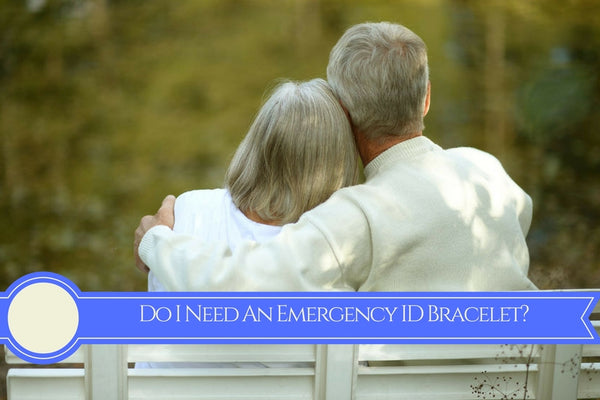Do I Need An Emergency ID Bracelet?
In every emergency, there is some information the paramedics and other first responders need to know in order to treat you—or your loved one—with the proper care. Sometimes this information is easy to share with those that need it. Other times, it will not be so easy, which is where having an emergency bracelet is critical.
As you likely know, these bracelets will give the paramedics the information they need to treat you appropriately. This information can appear directly on the bracelet or you could have directions on how to access your online medical datafile on the bracelet. In either case, the information gets to the person who needs it.

But what types of medical conditions would you need an Emergency ID bracelet for? Keep reading to find out—the answers might surprise you.
Allergies
Sometimes allergies are mild and do not cause a life-threatening reaction. In some cases, they will not impact your medical care. However, we recommend wearing an Emergency ID bracelet for severe allergies. Such allergies would include an allergy to penicillin, latex, nuts or other foods, any type of antibiotic or drug, and even an allergy to some animals.
Medical Conditions
If you have any medical condition that would alter the way paramedics, doctors, and other healthcare professionals should treat you, you may very well require a medical ID bracelet. Medical conditions that often require one of these bracelets include epilepsy, diabetes, Alzheimer’s and other forms of dementia, asthma, and heart disease.
Medications
If a paramedic needs to treat you in the field, or you are still unable to give the doctor information in the emergency room, and you are taking medication, you may require an Emergency ID bracelet. The medications that often require one of these bracelets include beta blockers, blood thinners, insulin, immunosuppressants, and chemotherapy. If you are in doubt about if you need a bracelet for your specific medication, consult your doctor for clarification.
Medical Devices
If you have a medical device in your body, it is important for the people treating you to know about it. To protect yourself in the event that you are in an emergency and are unable to communicate this information, we strongly recommend you consider obtaining an Emergency ID bracelet. Devices that often require the use of such a bracelet include a pacemaker, artificial heart valve, cochlear implant, or an insulin pump.
Other Needs
Even if you do not have an allergy, a medical condition, a medical device, and are not taking any medication, you may still wish to consider wearing a medical ID bracelet. There are two major things still left on this list: no blood transfusions and if you are an organ donor.
Some religious beliefs include a refusal to accept blood in their medical treatment. If you hold such a belief, it is important for you to have a medical ID that indicates as much, so the individuals treating you are aware of this fact and do not accidently give you blood.
If you are an organ donor, any accidents rendering you brain dead or at another point where doctors would normally consider organ donation, you are not going to be able to give your consent. While doctors can get in touch with family, there may not always be a lot of time. For this reason, you may wish to consider a medical ID bracelet.
Image: aletia / 123RF Stock Photo- Tags: Medical ID Products

